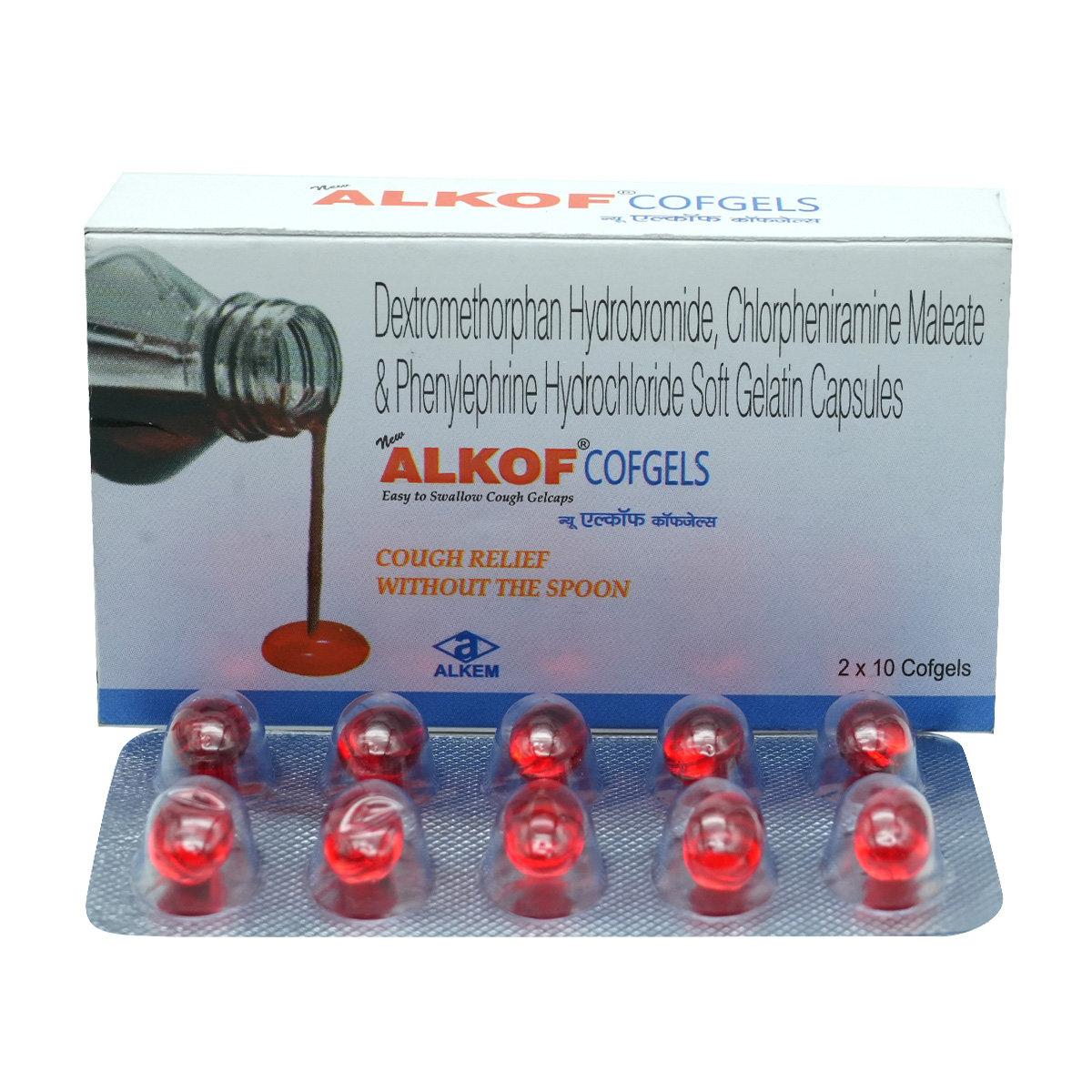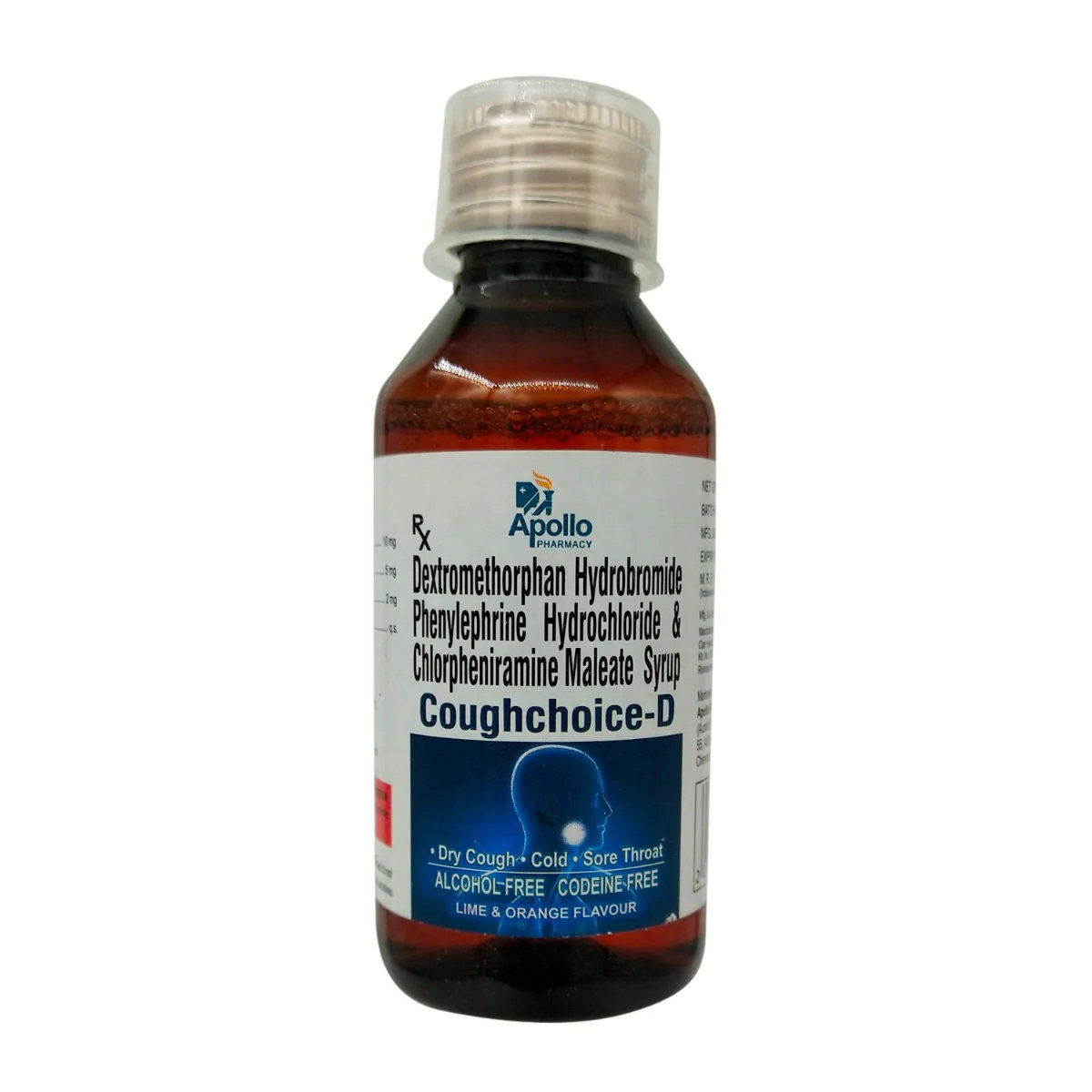Dextromethorphan Hydrobromide+diphenhydramine Hydrochloride+phenylephrine Hydrochloride
About Dextromethorphan Hydrobromide+diphenhydramine Hydrochloride+phenylephrine Hydrochloride
Dextromethorphan Hydrobromide+diphenhydramine Hydrochloride+phenylephrine Hydrochloride belongs to a class of medication called cough and cold preparations primarily used to treat dry cough. Coughing is the body's way of clearing irritants (like allergens, mucus, or smoke) from the airways and preventing infection. There are two types of coughs: dry and chesty/wet. A dry cough is tickly and doesn't produce any vicious or thick mucus, while a chesty cough (productive cough) produces mucous or sputum.
Dextromethorphan Hydrobromide+diphenhydramine Hydrochloride+phenylephrine Hydrochloride contains phenylephrine, dextromethorphan, and diphenhydramine. Phenylephrine helps shrink the blood vessels in the nasal passage, reducing the stuffy nose. Dextromethorphan works by blocking the transmission of nerve signals from the cough center in the brain to the muscles that produce the cough. Diphenhydramine helps relieve symptoms of allergies, such as sneezing, stuffy/runny nose, watery eyes, itching, swelling, and congestion or stiffness.
Take Dextromethorphan Hydrobromide+diphenhydramine Hydrochloride+phenylephrine Hydrochloride as advised by your physician. This medicine may cause specific common side effects, such as dry mouth/throat/nose, drowsiness, blurred vision, constipation, dizziness, restlessness, or excitation. Most of these side effects do not require medical attention and gradually resolve over time. However, if the side effects persist or worsen, please consult your doctor.
Inform your doctor if you are allergic to any of its components. Consult your doctor if you are pregnant or breastfeeding. Dextromethorphan Hydrobromide+diphenhydramine Hydrochloride+phenylephrine Hydrochloride is not recommended for children below 12 years of age. Dextromethorphan Hydrobromide+diphenhydramine Hydrochloride+phenylephrine Hydrochloride may cause dizziness, so drive or operate machinery only if you are alert. Avoid alcohol consumption as it may cause increased dizziness.
Uses of Dextromethorphan Hydrobromide+diphenhydramine Hydrochloride+phenylephrine Hydrochloride
Medicinal Benefits
Dextromethorphan Hydrobromide+diphenhydramine Hydrochloride+phenylephrine Hydrochloride is a combination medicine belonging to a class of drugs called cough and cold preparations primarily used to treat dry cough. Diphenhydramine works by blocking the action of histamine, a substance responsible for causing allergic reactions. It helps relieve allergy symptoms such as sneezing, runny nose, watery eyes, itching, swelling, congestion or stiffness. Phenylephrine is a decongestant that helps shrink the blood vessels located in the nasal passage, thereby reducing the stuffy nose. Dextromethorphan works by blocking the transmission of nerve signals from the cough centre in the brain to the muscles that produce the cough. Thus, Dextromethorphan Hydrobromide+diphenhydramine Hydrochloride+phenylephrine Hydrochloride helps relieve cough, cold and allergic symptoms.
Directions for Use
- Take Dextromethorphan Hydrobromide+diphenhydramine Hydrochloride+phenylephrine Hydrochloride as prescribed by your doctor.
- Shake the bottle well before use. Use the measuring cup provided with the pack to measure the recommended amount of syrup.
- It can be taken with or without food.
Storage
Side Effects of Dextromethorphan Hydrobromide+diphenhydramine Hydrochloride+phenylephrine Hydrochloride
- Dry mouth, throat or nose
- Drowsiness
- Dizziness
- Blurred vision
- Headache
- Constipation
- Restlessness or excitation
- Loss of appetite
Drug Warnings
If you are allergic to Dextromethorphan Hydrobromide+diphenhydramine Hydrochloride+phenylephrine Hydrochloride or any other medicines, please tell your doctor. Consult your doctor if you are pregnant or breastfeeding. Dextromethorphan Hydrobromide+diphenhydramine Hydrochloride+phenylephrine Hydrochloride is not recommended for children below 12 years of age. Avoid taking Dextromethorphan Hydrobromide+diphenhydramine Hydrochloride+phenylephrine Hydrochloride if you have taken medicines such as linezolid, phenelzine, selegiline, rasagiline, isocarboxazid, tranylcypromine and methylene blue injection in the past 14 days. Inform your doctor if you have glaucoma, urinary problems, enlarged prostate, phenylketonuria (a birth defect that causes accumulation of amino acid, phenylalanine in the body), cough with mucus or cough caused by asthma, smoking, chronic bronchitis or emphysema (a lung condition causing shortness of breath).
Drug Interactions
Drug-Drug Interaction: Dextromethorphan Hydrobromide+diphenhydramine Hydrochloride+phenylephrine Hydrochloride may interact with anti-psychotics (escitalopram, desvenlafaxine, vilazodone), anti-depressants (linezolid, phenelzine, selegiline, rasagiline, isocarboxazid, tranylcypromine), beta-blockers (metoprolol, atenolol), and muscle relaxants (carisoprodol, cyclobenzaprine).
Drug-Food Interaction: No interactions found/established.
Drug-Disease Interaction: Inform your doctor if you have liver or kidney disease, asthma, diabetes, glaucoma, cardiovascular diseases, enlarged prostate gland.
Drug-Drug Interactions Checker List:
Safety Advice

Alcohol
unsafeAvoid consumption of alcohol with Dextromethorphan Hydrobromide+diphenhydramine Hydrochloride+phenylephrine Hydrochloride, as it may increase drowsiness. Please consult a doctor before consuming alcohol with Dextromethorphan Hydrobromide+diphenhydramine Hydrochloride+phenylephrine Hydrochloride.

Pregnancy
consult your doctorThe safety of Dextromethorphan Hydrobromide+diphenhydramine Hydrochloride+phenylephrine Hydrochloride in pregnant women is unknown. Consult your doctor if you have any concerns; your doctor will prescribe only if the benefits outweigh the risks.

Breast Feeding
consult your doctorIt is unknown whether Dextromethorphan Hydrobromide+diphenhydramine Hydrochloride+phenylephrine Hydrochloride is excreted in human milk. Consult your doctor if you have any concerns; your doctor will decide whether breastfeeding mothers can take it.

Driving
unsafeSome people may experience dizziness or drowsiness after taking $ name. Therefore, drive only if you are alert.

Liver
consult your doctorInform your doctor if you have any liver problems before starting treatment with Dextromethorphan Hydrobromide+diphenhydramine Hydrochloride+phenylephrine Hydrochloride.

Kidney
consult your doctorInform your doctor if you have any liver problems before starting treatment with Dextromethorphan Hydrobromide+diphenhydramine Hydrochloride+phenylephrine Hydrochloride.

Children
unsafeDextromethorphan Hydrobromide+diphenhydramine Hydrochloride+phenylephrine Hydrochloride is not recommended for children below 12 years of age. However, please consult a doctor if you have any concerns.
Habit Forming
Diet & Lifestyle Advise
- Avoid dairy products such as milk, as it may increase mucus production. Also, avoid processed or refined foods.
- Drink plenty of fluids to avoid a dry throat. It also helps loosen mucus.
- Avoid citrus fruits as they may worsen the cough.
- Eat fruits rich in water content, such as pears, watermelon, peaches and pineapples.
Special Advise
- Talk to your doctor if your symptoms do not improve even after taking Dextromethorphan Hydrobromide+diphenhydramine Hydrochloride+phenylephrine Hydrochloride for 7 days.
- Contact a doctor immediately if you develop fever, rash or headache after taking Dextromethorphan Hydrobromide+diphenhydramine Hydrochloride+phenylephrine Hydrochloride.
- If you are about to undergo any medical tests or surgery, please inform your doctor that you are taking Dextromethorphan Hydrobromide+diphenhydramine Hydrochloride+phenylephrine Hydrochloride.
Patients Concern
Disease/Condition Glossary
Cough: Coughing is the body's method of removing irritants (such as allergens, mucus, or smoke) from airways and preventing infection. An allergy or viral infection typically brings on coughing, but coughing up mucus may indicate a respiratory tract infection. A productive cough, also known as a wet cough, brings up sputum (phlegm, mucus, and other matter) from the lungs, whereas a dry cough does not.
FAQs
Dextromethorphan Hydrobromide+diphenhydramine Hydrochloride+phenylephrine Hydrochloride is used to treat dry cough. It helps relieve cough, cold, and allergic symptoms.
Dextromethorphan Hydrobromide+diphenhydramine Hydrochloride+phenylephrine Hydrochloride contains Phenylephrine, Dextromethorphan, and diphenhydramine. Diphenhydramine blocks the action of histamine, a substance responsible for allergic reactions. Phenylephrine helps shrink the blood vessels in the nasal passage, thereby reducing a stuffy nose. Dextromethorphan hydrobromide blocks the transmission of nerve signals from the cough centre in the brain to the muscles that produce the cough.
It is not recommended to take Dextromethorphan Hydrobromide+diphenhydramine Hydrochloride+phenylephrine Hydrochloride along with any antidepressant medication, especially MAO inhibitors (linezolid, phenelzine, selegiline, rasagiline, isocarboxazid, tranylcypromine), as this may lead to unpleasant side effects or drug interactions. Also, Dextromethorphan Hydrobromide+diphenhydramine Hydrochloride+phenylephrine Hydrochloride should be taken at least 14 days after the last dose of antidepressants.
Yes, Dextromethorphan Hydrobromide+diphenhydramine Hydrochloride+phenylephrine Hydrochloride can cause drowsiness as a side effect. It contains dextromethorphan and chlorpheniramine, both of which can cause drowsiness. It's essential to be cautious when performing activities that require alertness, such as driving or operating machinery, until you know how the medication affects you.
Available Medicines for
Dextromethorphan Hydrobromide+diphenhydramine Hydrochloride+phenylephrine Hydrochloride







